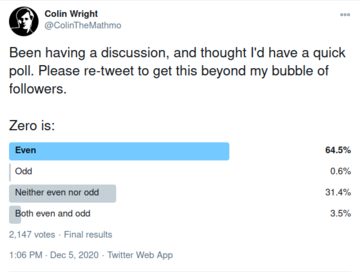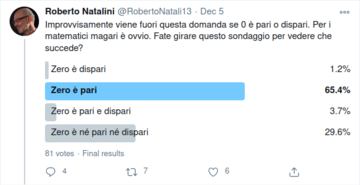
My latest posts can be found here: Previous blog posts:
Additionally, some earlier writings: |
Before you react to the title, and before you guess where this
is going and form a reaction, pause. I might not be about to
say what you expect. Of course, I might, but I might not, and
I'd ask you to wait a bit.
This was prompted by a discussion I was having a while ago. My friend is intelligent and knowledgeable, and frequently mentions things I don't know, so conversations are always an opportunity to learn, and then in return, to share. Always interesting. On this occasion conversation ranged, as always, and then I said something about zero being even. My friend was surprised, and said:
It was my turn to be surprised ... why would anyone be told that? But it was true ... for a time there were textbooks that stated specifically and categorically that the number zero is neither even nor odd. Curious, I ran a Twitter poll, and you can see here that of the 2047 votes cast, 64.5% said that zero is even, but 31.4% said it's neither. That's around 640 to 645 people of the 2047 who responded. A colleague of mine was utterly incredulous, and said that in Italy they would never say that. So he ran a poll and got almost exactly the same answer. He was stunned, so posted the question in Portuguese on Facebook and got pretty much the same result. It would be interesting to see the results from Russia, or from China, or Japan, but it certainly made a lot of people think.
So what's your reaction to those people saying that it's neither? More than one responder said that they are stupid, ignorant, or even worse, and I think that's absolutely the wrong reaction.
An illustrative tangentI'm reminded of a story I once heard. I don't know if it's true, but I strongly suspect it is, but it doesn't have to be. There was a poll taken in which one of the questions was:
Ignoring the obvious nit-picking and smug replies about "frames of reference" and the like, the answer is fairly obviously that the Earth goes around the Sun. But the kicker was the next question:
How can we reconcile this? How can someone know (correctly!) that the Earth goes around the Sun, but believe that it takes just a day? I have a theory.
Trying to understandMy theory is that for the vast majority of people, this is a completely useless piece of information. As such, they have learned by rote that the Earth goes around the Sun. They then have had neither reason nor opportunity to embed that isolated fact into their world models or general understanding. They don't care. What's more, and possibly what's worse, they believe that science is just a large body of isolated, unrelated, unmotivated "facts" that they needed to remember for a time, regurgitate in an exam, and which had absolutely no connection to their lives. They don't care. So when asked "Which goes around what?" some of them could dredge out that long-dormant "fact" and reproduce it. But to them, it's still the case that it takes a day ... you can see it go around! They have made their own connection between the random fact and their personal experience. It doesn't matter that it's not explaining anything, or even that it's completely wrong. It's just utterly irrelevant to them, so the incongruity is also irrelevant. They don't care. And similarly with the parity of the number zero. Why should they care? Why should this matter to them? Even when cities require even-numbered license plates to come in one day, and odd-numbered plates another, people don't care, they'll (mostly) just do as they're told, and they will have it spelled out for them. They don't care.
So why should we care whether they care?Personally, I am involved in outreach and enhancement. I am a maths and science communicator. And if I don't realise that this disconnect is real, then I will fail. Utterly. These people aren't stupid. I theorise that the vast majority of people have come to think of maths as a large body of unconnected, unrelated, unmotivated, incomprehensible jumble of "stuff," facts and processes that have no relevance to them, no coherence, and which just need to be remembered for a time, regurgitated in an exam, and then forgotten, dismissed as irrelevant. So they will miss out on seeing how a line of reasoning can be used to deduce things, they will listen to random ramblings, unconnected and emotive sentences, and be convinced by "logic" that is non-existent. If we are going to communicate to people why things are as they are, and why maths is useful, and why it's valuable, and why it's worth knowing, then first and foremost we need to acknowledge this:
We need to find a way to show that maths is coherent, and not just a jumble of "stuff." We need to find a way to get people to engage with wondering why things are as they are, to see that it's not arbitrary and unmotivated. It doesn't necessarily need to be made "relevant." Yes, for some people you can create the motivation that way, but for others, they will engage purely for the pleasure of finding things out, and the satisfaction in being able to see a reason behind things that were previously stated without justification. Someone (no name dropping) once said to me:
So if we can provoke a degree of curiosity, get people involved with a story, then provide an immensely satisfying denouement, then perhaps we can both educate and entertain, and leave them with more knowledge, understanding, and skill. People not knowing that zero is an even number is not stupidity, and it's not ignorance. It's an opportunity.
Send us a comment ...
|



 Suggest a change ( <--
What does this mean?) /
Send me email
Suggest a change ( <--
What does this mean?) /
Send me email